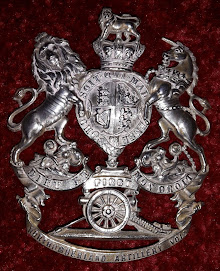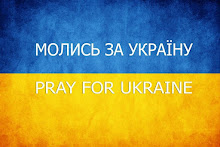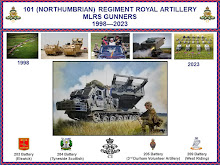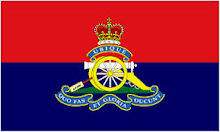The Colour of the 4th Battalion Tyneside Scottish (23rd (Service) Battalion Northumberland Fusiliers) was laid up in Jesmond Presbyterian after the First World War.
The Colour has now been refurbished and preserved in what is now Jesmond United Reformed Church. On the 15th October 2017 a church service was held to commemorate the Colour restoration and remember the men of 4TS.
The Tyneside Scottish were formed at the beginning of World War One with Lord Kitchener's call to arms and the formation of the Pals Battalions.
The concept of a battalion consisting of Scotsmen living on Tyneside was the idea of local physician Sir Thomas Oliver and retired soldier Major Charles Innes-Hopkins. The first meeting of the Tyneside Scottish Committee was held 14th September 1914 in the Mayor of Newcastle’s Chambers.
Recruiting offices for the Tyneside Scottish were opened throughout the North East, thousands of posters and handbills were printed and recruiting meetings organised.
On 26th October 1914, 10 days after recruiting for the Tyneside Scottish commenced, 1,268 men had enrolled, though the majority of volunteers were not of Scottish origin. The rush to the colours continued and by mid Tuesday 10th November 1914, two more battalions were formed.
On 26th October 1914, 10 days after recruiting for the Tyneside Scottish commenced, 1,268 men had enrolled, though the majority of volunteers were not of Scottish origin. The rush to the colours continued and by mid Tuesday 10th November 1914, two more battalions were formed.
In the 6 days from 10th November 1914 to 16th November 1914, the Fourth Battalion Tyneside Scottish was recruited. In a period of 28 days the Tyneside Scottish Brigade was formed.
The transition from Citizen to Soldier started around the Newcastle area with men being billeted and training wherever space could be found. The Brigade Headquarters was established in Eskdale Terrace Jesmond. On January 3rd 1915 the TS held their first church service in Jesmond Presbyterian Church, where the 4TS Colour would be laid up 5 years later.
At 07:28 a.m. two huge mines in the vicinity were detonated. The concussion shook the ground for miles around, the air was filled with dust and debris. Two minutes later the Tyneside Scottish left their trenches and advanced towards the German front line.
From the higher ground above the valleys of ‘Sausage’ and ‘Mash’ German machine gunners emerged from camouflaged positions. The machine guns together with German artillery, which the preliminary bombardment failed to destroy, brought down murderous fire on the Tyneside Scots.
The attack continued with extraordinary heroism, but this was to no avail as the men of the Tyneside Scottish were mown down. As night fell on the Tyneside Scottish sector the remnants of the Brigade withdrew to the trenches they had left that morning, no mans land strewn with dead and wounded.
Losses were such that the Tyneside Scottish, together with the Tyneside Irish who had suffered similar heavy casualties, were withdrawn from the line a few days later. The heaviest casualties were sustained by the 4th Battalion Tyneside Scottish.
Losses were such that the Tyneside Scottish, together with the Tyneside Irish who had suffered similar heavy casualties, were withdrawn from the line a few days later. The heaviest casualties were sustained by the 4th Battalion Tyneside Scottish.
The TS were moved to the area around Armentieres where they started to regenerate and reinforcements began to arrive. Some of those wounded at la Boisselle would return back to the Tyneside Scottish. By 1917 the Brigade was back to strength.
At 05:30 9th April 1917 the Tyneside Scottish went over the top at the start of the Battle of Arras. Part of the 34th Division they attacked north of the River Scarpe. The introduction of the creeping barrage and the wind blowing snow into the enemy’s faces allowed the men to achieve their objectives. The expected breakthrough did not occur, the Germans counter attacking and holding the British advance.
The next offensive to attempt a break through of the German lines was during the Third Battle of Ypres - Passchendaele. The offensive ground to a halt in the mud and slime of the battlefield. The Tyneside Scottish one of many units that fought in the atrocious conditions for little gain.
The mounting casualties throughout the British Army led to a reorganisation which reduced the number of battalions in a brigade to three. On 10th June 1918, the 1st and 2nd Battalions Tyneside Scottish were disbanded. The Fourth Battalion TS continued the fight together with the Third TS and 2nd Tyneside Irish. The reorganised Brigade would be engaged in the Battle of the Lys holding the German Spring Offensive.
In May 1918 the Tyneside Scottish would be reduced to a training cadre, their role being to train the American Expeditionary Force. When the Armistice was signed in November 1918 the TS were serving as Lines of Communication Troops.
The cadre remained in France. One year after becoming a cadre, the 4th Battalion received their Colour from the General Officer Commanding Line of Communication Troops. On 6th June 1919 the Tyneside Scottish was disbanded and the last of the TS returned home to Tyneside. For the cadre of the 4th Battalion Tyneside Scottish their final duty was to lay up the Colour at the Jesmond Presbyterian Church.
The Colour Party marched from Westgate Road, along Collingwood Street, Grey Street, and Northumberland Street to the Church. Along the way they were cheered by thousands of Tynesiders.
On the 28th June 1919 the Colour was laid up and remains in the Church today as a lasting reminder of the men of the 4th Battalion Tyneside Scottish (23NF)
4th Battalion Tyneside Scottish Commemoration Service
Jesmond United Reformed Church
15th October 2017
 |
| Standards and Escort To the Colour march in |
 |
| Civic dignitaries |
 |
| Standards and ACF Tyneside Scottish Detachment |
 |
| Reading the address |
 |
| 4 TS Colour unveiled |
 |
| Last Post |
 |
| Two Minutes Silence |
 |
| Revile |
 |
| Wreath Bearers |
 |
| Act of Remembrance |
4th Battalion Tyneside Scottish Colour














































